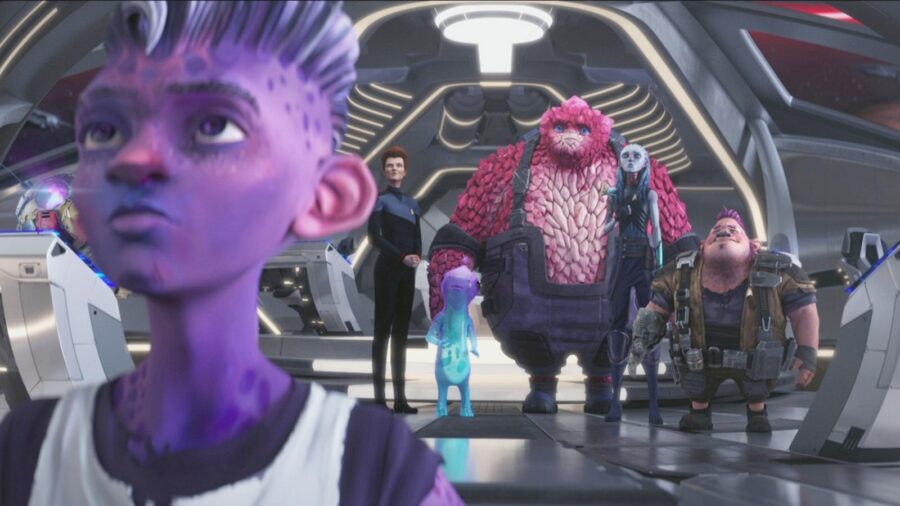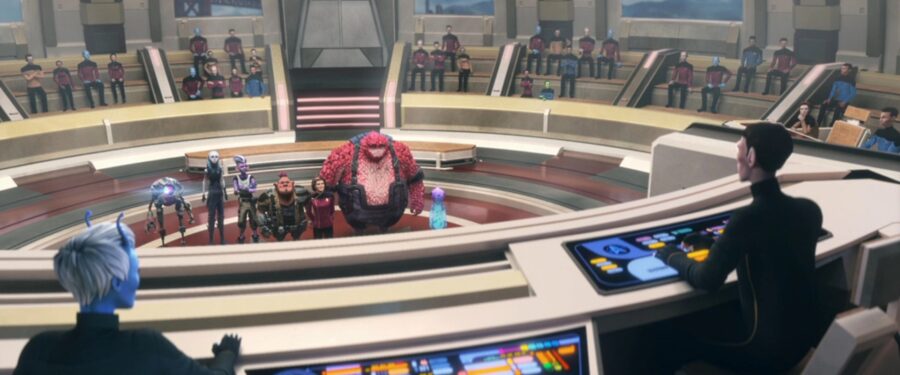Star Trek: Prodigy Season 1 Finale Review: A Satisfying, But Imperfect Conclusion
Star Trek: Prodigy's Season 1 finale is good, but its format limits its punch.

The Star Trek: Prodigy Season 1 finale is, to put it succinctly, good but not great. It answers a lot of big questions, asks enough new ones to keep you excited for Season 2, and gets just emotional enough to trigger the feels without leaving you weeping for too long. But because of its short runtime, “Supernova (Part 2)” feels like a 50 percent wrap-up, which is particularly disappointing after last week’s excellent “Supernova (Part 1)”.
WARNING: Big SPOILERS follow for the Star Trek: Prodigy Season 1 finale
STAR TREK: PRODIGY SEASON 1 FINALE REVIEW SCORE:

The heroes figure out a way to save Starfleet from the Living Construct’s destructive virus but — in a turn reminiscent of both 1984’s Star Trek III: The Search for Spock and 1994’s Star Trek: Generations — their method of victory involves sacrificing the U.S.S. Protostar and finding themselves adrift in space. Though her original intention is to create a copy of herself to survive with the young heroes, the holographic Janeway (Kate Mulgrew) proves to have grown too complex to store her program and instead is destroyed along with the Protostar.
The rest of the Star Trek: Prodigy Season 1 finale deals with answering the lingering questions of whether or not the heroes will be allowed into Starfleet, the fate of Chakotay (Robert Beltran), and whether or not the grim destiny awaiting Gwyn’s (Ella Purnell) people can be avoided. Chakotay is still lost somewhere in the future, but the real Janeway learns her holographic counterpart made it possible to receive messages from the Captain in the present.
The Star Trek: Prodigy Season 1 finale sees the surviving heroes scooped up by Starfleet and, in spite of some dissenting voices from Starfleet’s upper echelons, the real Admiral Janeway convinces them to allow everyone but Gwyn to serve under her command. Gwyn is off on her own quest to find a way to save her people.

It’s the wrap-up that exposes the weakness to the Star Trek: Prodigy Season 1 finale, in that there’s just too much of it. As opposed to last week’s episode, which was filled with so much excitement and suspense, it was a genuine surprise at the end to learn it was the same length (24 minutes) as every other chapter, the second half doesn’t feel quite as big. I’d suggest you watch last week’s episode and this one in one sitting in order to get the full impact.
There is one other thing that bothers me about the Star Trek: Prodigy Season 1 finale in how it relates to the larger mythos: that Dal (Brett Gray) is so easily let into Starfleet, in spite of being an Augment. The first major Augment character introduced in the franchise, as remembered by Memory Alpha, is Khan Noonien Singh (Ricardo Montalban) and the memory of his crimes leaves the Federation unfriendly to other Augments. The prejudice against augmented people is one of the lingering chips in the armor of Gene Roddenberry’s sci-fi utopia, and it feels like it’s dealt with far too casually here.
Very little about the story of Alexander Siddig’s Julian Bashir in Star Trek: Deep Space Nine, for example, impacted the character as much as the reveal that he had secretly been an Augment for years. Likewise, in the more recent Star Trek: Strange New Worlds, the inaugural season ends on a cliffhanger when Una Chin-Riley (Rebecca Romijn) is outed as an Augment and arrested by Starfleet. Earlier in the season, we find out an entire colony of Illyrians–who are Augments–unintentionally transformed, leaving their world one big ghost town, in an attempt to undo their augmentations so they could join the Federation.
So for the Star Trek: Prodigy Season 1 finale to allow Dal into the fold because of nothing more than an impassioned speech from Janeway doesn’t feel earned. This could ultimately lead to good stories — e.g. possibly having Dal needing to deal with prejudice from his shipmates and using that to explore bigotry — but I feel like it was accomplished too quickly and cleanly. It’s the one prejudice left in a society almost completely free of prejudice, and that’s too strong to dismiss with “Janeway made a speech.”










